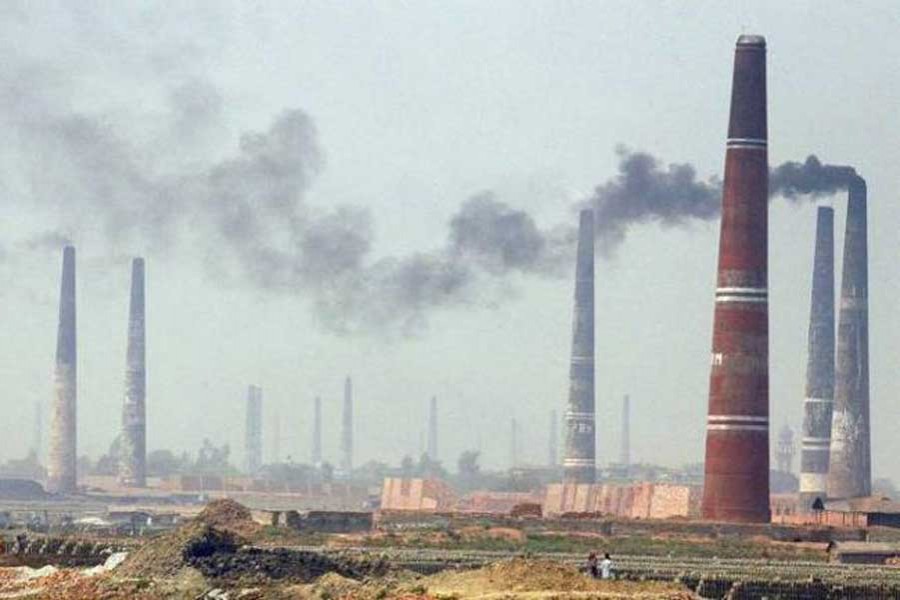Bangladesh has been among the worst countries in the world in terms of undergoing the effect of environmental pollution, but what is more concerning is the financial burden it causes.


Industrial waste, transport and brick kiln emissions, chemical fertiliser use in agricultural fields, faulty solid waste management and lead pollution are vitiating the environment and taking toll on public health as well as economy.
Once a citizen loses life due to disease caused by pollutants, it ultimately affects the economy. As people fall sick due to pollution, they have to make high out-of-pocket spending on health, explained Prof Ahmad Kamruzzaman Majumder, director, Centre for Atmospheric Pollution Studies.
According to the World Bank research, losses from air pollution in 2019 ranged from $11.5 billion to $13 billion, which was 3.9-4.4 per cent of Bangladesh’s GDP.
Lead poison increases the risk of decreased intelligence in children, learning problems and behavioural disorders.
It did not end here. Lead pollution alone caused an economic cost of $10,897 million, which is 3.6 per cent of the country’s annual GDP, disclosed a study published in the Lancet scientific journal.
Among the polluters, the decades-old unfit public buses have become a key contributor to growing air pollution in Dhaka. Old engines emit toxic emissions that have serious health effects than other sources of air pollution.
According to the study of the University of Chicago, fine particulate matters (PM2.5) shorten the average life expectancy in Bangladesh by 6.8 years.
Experts continue to advocate green construction or the use of concrete blocks in construction, but the move is yet to become popular in the country for high tax on raw materials.
Therefore, more traditional brick kilns are engulfing the country’s air.
To address pollution, the government is taking loans from global lenders, much to an economic pressure on the nation.
The government has undertaken projects worth Tk 30 billion financed by the World Bank to address air, river and e-waste pollution. Furthermore, a big project has been taken to water purification. But that money would not be needed if there was no such pollution, observed Prof Majumder.
Amid the growing concern, the environment ministry recently prepared a ‘National Air Quality Management Plan’ to improve Dhaka’s air quality while the government has taken a move to phase out unfit and old buses of 20 years from Dhaka’s streets from May 2025.
To support the goal, the Department of Environment (DoE) shut down 462 brick kilns in anti-pollution mobile drives across the country from January until March 09 and fined an estimated Tk 200 million.
According to Prof Shafi Mohammad Tareq of the Department of Environmental Sciences at Jahangirnagar University, the immediate victim of environmental pollution is people’s health.
“Citizen’s life and health are more important than money. So, the government should move to make the use of green construction popular,” Prof Tareq, a fellow at the Higher Education Academy-UK, told the FE.
He categorises all the pollution in three-industrial, agricultural and household.
The city does not have a complete and proper waste management system yet. Solid waste management is a prime concern as most of the household waste ends up in rivers around the city along with industrial waste.
“Water pollution is among major concerns for people, particularly in Dhaka. We see a similar effect of environmental pollution in agriculture-the use of excessive fertilisers not only makes food hazardous, but also destroys the fertility of soil,” explained Prof Tareq.
“The country has lost so many species of native fish due to river pollution. Hundreds of rivers have died in the last 50 years, directly effecting biodiversity,” he continued.
Amid growing industrial pollution, the DoE, however, sounded a final warning to 2,046 industrial establishments in Dhaka, Gazipur, Narayanganj and Narsingdi last month to operate effluent treatment plants and sewage treatment plants continuously.
The target is to curb pollution in the Buriganga, Sitalakkhya, Turag and Balu rivers surrounding the capital city of Dhaka.
However, many factories either failed to install ETPs or bypassed them, and were still releasing untreated waste into the rivers.
The faulty waste management system is a major source of environmental pollution. Household solid waste is also taken by Dhaka city corporation authorities and dumped in landfills in Dhaka.
“As those landfills are not established in a scientific manner, they have now become a major polluter,” claimed Prof Tareq.
Environment adviser Syeda Rizwana Hasan on Wednesday said the legal framework and complaint resolution mechanism of the DoE would be strengthened to ensure more effective handling of environmental cases.
Strict measures will be taken to prevent pollution so that offenders do not escape accountability, ensuring environmental justice.
The adviser stated that legal action against air, water and industrial pollution would be intensified further.
nsrafsanju@gmail.com

